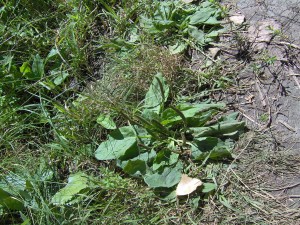I have a persistent early childhood memory which is about walking along a track between fields near the Norfolk coast in Eastern England. We used to go for holidays there when I was a child, and there’s a strong set of associations between contentedly walking in early evening sun, a dry, beaten track carpeted with pineapple weed and common plantain, overgrown late summer vegetation beside the track, and wheat fields beyond. Several times recently I have realised that when walking along in a contented frame of mind, this memory is often at least partially evoked. Perhaps it is the late summer vegetation that can give me a partial taste of this memory when walking along a track, even where the landscape is otherwise quite different.
Is this nostalgia? Well, that all depends on how you define the term. I would rather distinguish nostalgia from this kind of experience of the past giving meaning to the present. Nostalgia involves hanging on to the past in some way, absolutising it in a way that distorts the present: but this experience seems rather to augment the present and make my experience of it fuller. I appreciate the flavour of the present landscape more because it is also, simultaneously, this past landscape. I think, perhaps, we often do this – probably more often than we realise. We integrate our experience through time by to some extent having one experience in the present in the terms of one in the past. That way the meaning that we attributed to the past experience is added to the present experience, not taken away from it.
Writers make a great deal of use of this phenomenon. There is Marcel Proust’s famous example of the taste of madeleine cake, that evokes a whole set of previous experiences. There are many novels in which writers have incorporated their own youthful experiences into a fictionalised narrative that carries more power because of it, such as D.H. Lawrence’s ‘Sons and Lovers’. In some of these, though, perhaps we can be doubtful about whether we are dealing with the meaning of the past augmenting the present, or nostalgia of a narrower kind.
Nostalgia of a narrower kind I would take to involve forming beliefs about the past experience that then distort one’s judgements about the present. The other day, accessing the Norfolk experience when walking, I began to see how it could turn into nostalgia. Supposing, in pursuit of this lovely memory, I tried to re-experience it. I might drive for several hours back to Norfolk and go in search of the exact spot where my childhood memory took place. The chances are, however, that I would be disappointed. Even if the landscape and the weather happened to be as I remembered them, I would have changed in a way that would make that fleeting mood that has somehow got engraved on my memory elusive. I would probably feel that I was having a boring adult experience of walking along that track, not an enchanted childhood one. Trying to recapture that experience, rather than integrate it, would be an absolutising move, taking an abstract idea of that experience and exalting it in a way that does no justice to its context in experience, then or now.
One kind of extreme absolutising response would be to idealise the experience nostalgically, and the other would be to dismiss it and assume that the experience is not relevant to me now. But the Middle Way seems to involve the possibility of a full acknowledgement of the power of that experience, together with an acceptance that now, forty years later, my experience is different. This is not just a version of the commonplace observation that we cannot recapture the past, for we can indeed recapture the past, in the present. Somehow the past can carry on enriching the present.
Perhaps this is the gift of age? I’m sure those older than I am can say more about whether this can happen further the older one gets. Is the savour of past experiences potentially integrated more with present ones, the more past experience one has? The gift of youth might be single-pointed, full-blooded experiences that age cannot recapture, but the gift of age might be multifaceted, rich, complex experiences of the meaning of the present integrated with the past.
